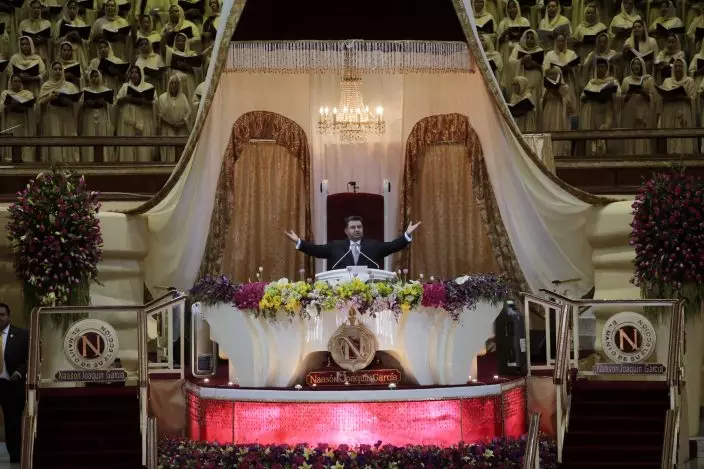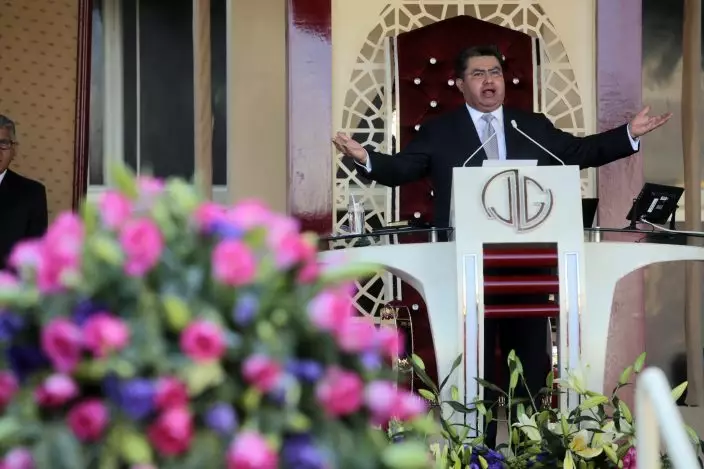The leader and self-proclaimed apostle of La Luz del Mundo, a Mexico-based church with branches in the U.S. that claims over 1 million followers, has been charged with human trafficking and child rape, California officials announced Tuesday.
Joaquín García and a follower of the church, 24-year-old Susana Medina Oaxaca, were arrested Monday after landing at Los Angeles International Airport, California Attorney General Xavier Becerra's office said.
Around 1,000 worshippers gathered at the headquarters of La Luz del Mundo in Guadalajara, Jalisco, on Tuesday evening to pray for García as he was held in Los Angeles on $25 million bail.

In this Aug. 9, 2018, photo, Joaquin Garcia leads a service at his church "La Luz del Mundo" in Guadalajara, Mexico. Garcia, the leader and self-proclaimed apostle of La Luz del Mundo, a controversial church that claims over 1 million followers, has been charged with human trafficking and child rape, California authorities said on Tuesday, June 4, 2019. (AP Photo)
García, 50, faces 26 counts of felony charges that range from human trafficking and production of child pornography to forcible rape of a minor. The charges detail a series of disturbing allegations involving three girls and one woman between 2015 and 2018 in Los Angeles County.
The fundamentalist church, whose name translates to The Light of the World, has been the subject of child sex abuse allegations for years but authorities in Mexico have never filed criminal charges. It has more than 15,000 churches in 58 countries according to its website. The church's followers must adhere to a strict moral code in exchange for the promise of eternal salvation.
García — who was a minister in Los Angeles and other parts of Southern California before becoming the church's leader — coerced the victims into performing sex acts by telling them that refusing would be going against God, authorities said. He allegedly forced the victims, who were members of the church, to sexually touch themselves and each other. One of his co-defendants also allegedly took nude photographs of the victims and sent the pictures to García.

In this Aug. 9, 2018, photo, Joaquin Garcia leads a service at his church "La Luz del Mundo" in Guadalajara, Mexico. Garcia, the leader and self-proclaimed apostle of La Luz del Mundo, a controversial church that claims over 1 million followers, has been charged with human trafficking and child rape, California authorities said on Tuesday, June 4, 2019. (AP Photo)
García told one of the victims and others in 2017, after they had completed a "flirty" dance wearing "as little clothing as possible," that kings can have mistresses and an apostle of God cannot be judged for his actions, the complaint states.
"Crimes like those alleged in this complaint have no place in our society. Period," Becerra said in a press release. "We must not turn a blind eye to sexual violence and trafficking in our state."
The attorney general's investigation began in 2018, prompted in part by a tip to the state's Department of Justice through an online clergy abuse complaint form.
David Correa, a spokesman from the church's headquarters, said in a phone call that they learned about the charges from the media.
"We categorically deny those false accusations," Correa said. "We know him personally and he is an honorable and honest man."
Church officials said García has always behaved lawfully and rejected the attorney general's charges.
The church's statement Tuesday said they hoped the accusations would not lead to discrimination and religious intolerance against its followers.
A third follower, Alondra Ocampo, 36, was arrested in Los Angeles County and is being held at the sheriff's Century Regional Detention Facility in Lynwood ahead of her arraignment Wednesday in Los Angeles. A fourth defendant, Azalea Rangel Melendez, remains at large.
It wasn't immediately clear whether the defendants had an attorney.
In May, an opera concert at Palacio de Bellas Artes, the main cultural venue in Mexico, generated controversy because in some places it was presented as a tribute to García. Critics said a secular state such as Mexico shouldn't use a public place for that purpose.
The work, "The Guardian of the Mirror," was broadcast on social networks and screened outside the Palace, with the church's followers in the audience.
La Luz del Mundo denied that it was an homage and said the opinions expressed in social networks were not promoted by the institution.
Airport police referred media inquiries to Customs and Border Patrol, which did not immediately have a comment.
Verza contributed reporting from Mexico City.
UNITED NATIONS (AP) — Russia on Wednesday vetoed a U.N. resolution sponsored by the United States and Japan calling on all nations to prevent a dangerous nuclear arms race in outer space, calling it “a dirty spectacle” that cherry picks weapons of mass destruction from all other weapons that should also be banned.
The vote in the 15-member Security Council was 13 in favor, Russia opposed and China abstaining.
The resolution would have called on all countries not to develop or deploy nuclear arms or other weapons of mass destruction in space, as banned under a 1967 international treaty that included the U.S. and Russia, and to agree to the need to verify compliance.
U.S. Ambassador Linda Thomas-Greenfield said after the vote that Russian President Vladimir Putin has said Moscow has no intention of deploying nuclear weapons in space.
“Today’s veto begs the question: Why? Why, if you are following the rules, would you not support a resolution that reaffirms them? What could you possibly be hiding,” she asked. “It’s baffling. And it’s a shame.”
Russia’s U.N. Ambassador Vassily Nebenzia dismissed the resolution as “absolutely absurd and politicized,” and said it didn’t go far enough in banning all types of weapons in space.
Russia and China proposed an amendment to the U.S.-Japan draft that would call on all countries, especially those with major space capabilities, “to prevent for all time the placement of weapons in outer space, and the threat of use of force in outer spaces.”
The vote was 7 countries in favor, 7 against, and one abstention and the amendment was defeated because it failed to get the minimum 9 “yes” votes required for adoption.
The U.S. opposed the amendment, and after the vote Nebenzia addressed the U.S. ambassador saying: “We want a ban on the placement of weapons of any kind in outer space, not just WMDs (weapons of mass destruction). But you don’t want that. And let me ask you that very same question. Why?”
He said much of the U.S. and Japan’s actions become clear “if we recall that the U.S. and their allies announced some time ago plans to place weapons … in outer space.”
Nebenzia accused the U.S. of blocking a Russian-Chinese proposal since 2008 for a treaty against putting weapons in outer space.
Thomas-Greenfield accused Russia of undermining global treaties to prevent the spread of nuclear weapons, irresponsibly invoking “dangerous nuclear rhetoric,” walking away from several of its arms control obligations, and refusing to engage “in substantive discussions around arms control or risk reduction.”
She called Wednesday’s vote “a real missed opportunity to rebuild much-needed trust in existing arms control obligations.”
Thomas-Greenfield’s announcement of the resolution on March 18 followed White House confirmation in February that Russia has obtained a “troubling” anti-satellite weapon capability, although such a weapon is not operational yet.
Putin declared later that Moscow has no intention of deploying nuclear weapons in space, claiming that the country has only developed space capabilities similar to those of the U.S.
Thomas-Greenfield said before the vote that the world is just beginning to understand “the catastrophic ramifications of a nuclear explosion in space.”
It could destroy “thousands of satellites operated by countries and companies around the world — and wipe out the vital communications, scientific, meteorological, agricultural, commercial, and national security services we all depend on,” she said.
The defeated draft resolution said “the prevention of an arms race in outer space would avert a grave danger for international peace and security.” It would have urged all countries carrying out activities in exploring and using outer space to comply with international law and the U.N. Charter.
The draft would have affirmed that countries that ratified the 1967 Outer Space Treaty must comply with their obligations not to put in orbit around the Earth “any objects” with weapons of mass destruction, or install them “on celestial bodies, or station such weapons in outer space.”
The treaty, ratified by some 114 countries, including the U.S. and Russia, prohibits the deployment of “nuclear weapons or any other kinds of weapons of mass destruction” in orbit or the stationing of “weapons in outer space in any other manner.”
The draft resolution emphasized “the necessity of further measures, including political commitments and legally binding instruments, with appropriate and effective provisions for verification, to prevent an arms race in outer space in all its aspects.”
It reiterated that the U.N. Conference on Disarmament, based in Geneva, has the primary responsibility to negotiate agreements on preventing an arms race in outer space.
The 65-nation body has achieved few results and has largely devolved into a venue for countries to voice criticism of others’ weapons programs or defend their own. The draft resolution would have urged the conference “to adopt and implement a balanced and comprehensive program of work.”
At the March council meeting where the U.S.-Japan initiative was launched, U.N. Secretary-General António Guterres warned that “geopolitical tensions and mistrust have escalated the risk of nuclear warfare to its highest point in decades.”
He said the movie “Oppenheimer” about Robert Oppenheimer, who directed the U.S. project during World War II that developed the atomic bomb, “brought the harsh reality of nuclear doomsday to vivid life for millions around the world.”
“Humanity cannot survive a sequel to Oppenheimer,” the U.N. chief said.

United States Ambassador and Representative to the United Nations Linda Thomas-Greenfield addresses members of the U.N. Security Council before voting during a meeting on Non-proliferation of nuclear weapons, Wednesday, April 24, 2024 at United Nations headquarters. (AP Photo/Eduardo Munoz Alvarez)

FILE - U.S. Ambassador to United Nations Linda Thomas-Greenfield speaks on Thursday, April 18, 2024, in Tokyo. The U.N. Security Council is set to vote Wednesday, April 24, 2024, on a resolution announced by Thomas-Greenfield, calling on all nations to prevent a dangerous nuclear arms race in outer space. It is likely to be vetoed by Russia. (AP Photo/Eugene Hoshiko, Pool, File)













